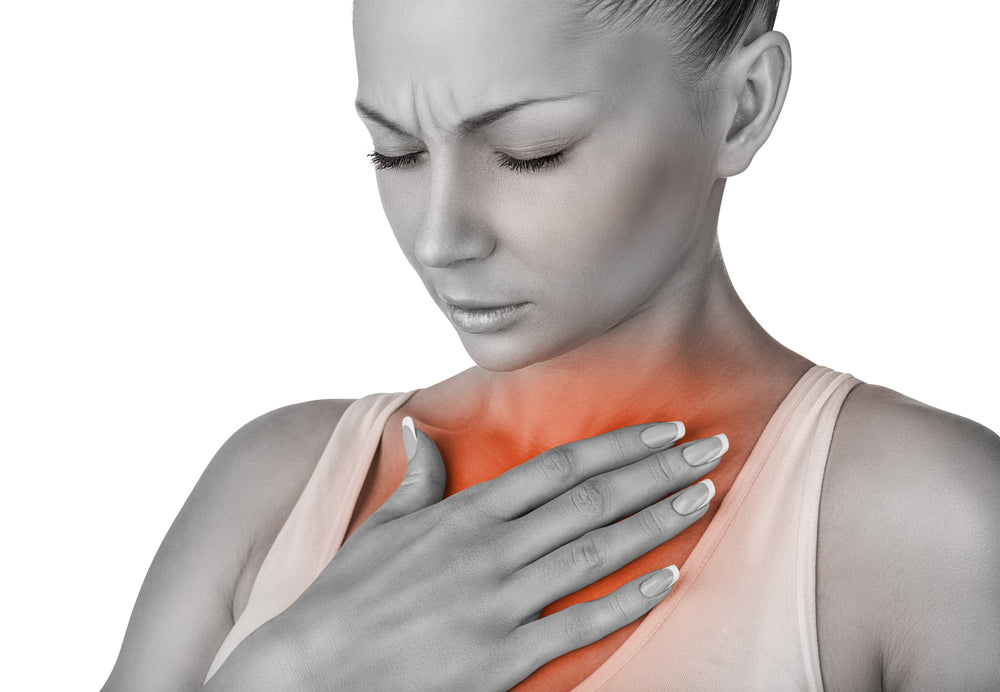Heartburn vs. Acid Reflux: What's the Difference?

Share
Heartburn and acid reflux are often referred to as the same condition, however they are not the same thing. Both conditions can be uncomfortable and cause a burning sensation in the chest and throat, but they have different causes and treatments.
In this article, we discuss the similarities and differences between heartburn and acid reflux.
What is Heartburn?

Heartburn is a common symptom of acid reflux, but it is not the same thing. It is a burning feeling in the chest and throat that occurs when stomach acid backs up into the esophagus. Heartburn can be caused by a variety of factors, including:
- Eating spicy or fatty foods
- Eating too much or too quickly
- Drinking alcohol or caffeine
- Smoking
- Stress and anxiety
- Pregnancy
What are the Symptoms of Heartburn?
The symptoms of heartburn include:
- Burning sensation in the chest and throat
- Sour or bitter taste in the mouth
- Difficulty swallowing
- Regurgitation of food or liquid
- Feeling of fullness or bloating
What is Acid Reflux?

Acid reflux is a condition that occurs when the muscle at the end of the esophagus, known as the lower esophageal sphincter (LES), doesn't close properly, allowing stomach acid to flow back into the esophagus. (2) This can irritate the lining of the esophagus and cause symptoms such as:
- Heartburn
- Chest pain
- Regurgitation of food or liquid
- Difficulty swallowing
- Nausea or vomiting
- Coughing or wheezing
What Causes Acid Reflux?
Acid reflux can be caused by a variety of factors, including:
- Eating large meals or lying down immediately after eating
- Eating certain foods, such as citrus, tomato, chocolate, mint, garlic, onions, or spicy or fatty foods
- Drinking alcohol or caffeine
- Smoking
- Being overweight or obese
- Pregnancy
- Hiatal hernia
- Certain medications, such as aspirin or ibuprofen
Acid Reflux vs. Heartburn: What's the Difference?

Acid reflux is a condition that can cause heartburn, but heartburn is just one of the many symptoms of acid reflux. Acid reflux can cause other symptoms, such as chest pain, regurgitation of food or liquid, difficulty swallowing, nausea or vomiting, and coughing or wheezing. Heartburn is typically described as a burning sensation in the chest and throat.
Heartburn vs. Indigestion vs. Acid Reflux
The term indigestion is used to describe a variety of symptoms that occur in the upper abdomen after eating, including bloating, belching, and nausea. Indigestion can have a number of causes, including overeating, eating too quickly, or consuming spicy or fatty foods. Heartburn is a symptom of acid reflux, while indigestion can have a variety of causes.
Acid Reflux vs. Heartburn Pregnancy
Both acid reflux and heartburn can be more common during pregnancy due to hormonal changes and pressure on the stomach from the growing fetus. However, heartburn is often more common during pregnancy than acid reflux. (3)
Acid Reflux vs. Heartburn Symptoms
The symptoms of acid reflux and heartburn can be similar, but acid reflux can cause other symptoms as well. The symptoms of acid reflux that are most common include heartburn, chest pain, regurgitation of food or liquid, difficulty swallowing, nausea or vomiting, and coughing or wheezing. The symptoms of heartburn include a burning sensation in the chest and throat, a sour or bitter taste in the mouth, difficulty swallowing, regurgitation of food or liquid, and feeling of fullness or bloating.
Natural Ways to Treat Heartburn

Below, we will share some natural ways that you can help to get rid of heartburn.
- Ginger: Ginger has natural anti-inflammatory properties that can help reduce inflammation in the esophagus and stomach. (4) Drinking ginger tea or adding fresh ginger to your meals may help reduce heartburn symptoms.
- Baking Soda: Baking soda may neutralize stomach acid and provide relief from heartburn. Mix a teaspoon of baking soda in a glass of water and drink it slowly.
- Aloe Vera Juice: Aloe vera juice can help soothe the esophagus and reduce inflammation. (5) Drink 1/4 cup of aloe vera juice 20 minutes before meals to help prevent heartburn.
- Apple Cider Vinegar: Although it may seem counterintuitive, apple cider vinegar can help reduce heartburn symptoms. To use apple cider vinegar for heartburn relief, mix a tablespoon of apple cider vinegar in a glass of water and drink it before meals.
- Chamomile Tea: Chamomile tea can help reduce inflammation and relax the muscles in the digestive tract. Drinking chamomile tea before bedtime may help prevent heartburn symptoms during the night.
Natural Ways to Treat Acid Reflux

Below, we will share some natural ways that you can help to get rid of acid reflux.
- Slippery Elm: Slippery elm can help soothe the lining of the esophagus and reduce inflammation. Drink slippery elm tea or take slippery elm supplements to help reduce acid reflux symptoms.
- Marshmallow Root: Marshmallow root can help reduce inflammation and soothe the lining of the esophagus. Drink marshmallow root tea or take marshmallow root supplements to help reduce acid reflux symptoms.
- Licorice: Licorice can help reduce inflammation and protect the lining of the esophagus. Drink licorice tea or take licorice supplements to help reduce acid reflux symptoms.
- Probiotics: Probiotics may help improve digestive function and reduce acid reflux symptoms. (6) Eat foods that are rich in probiotics, such as yogurt, kefir, sauerkraut, and kimchi, or take probiotic supplements.
- DGL (Deglycyrrhizinated Licorice): DGL is a form of licorice that has been processed to remove the compound that can raise blood pressure. DGL can help reduce inflammation and protect the lining of the esophagus. (7) Chew DGL tablets before meals to help prevent acid reflux symptoms.
Health Tips to Prevent Heartburn and Acid Reflux

In addition to the above-mentioned natural remedies, there are also general health tips you can follow to prevent heartburn and acid reflux, such as:
- Eat a healthy diet: Eat a diet that is rich in fruits, vegetables, whole grains, and lean protein, and low in processed foods, fried foods, and sugary drinks.
- Stay hydrated: Drink plenty of water and avoid sugary drinks, alcohol, and caffeine.
- Maintain a healthy weight: Being overweight or obese can increase the risk of heartburn and acid reflux.
- Practice good posture: Sit up straight and avoid slouching to help prevent acid reflux symptoms.
- Manage stress: Stress can increase the production of stomach acid and worsen heartburn and acid reflux symptoms. Practice stress-reducing activities such as yoga, meditation, or deep breathing exercises.
Essentially, there are many natural ways to treat heartburn and acid reflux, as well as general health tips to help prevent both conditions. However, if you experience frequent or severe symptoms, it's important to consult your doctor to determine the underlying cause and receive appropriate treatment.
Summary
Acid reflux and heartburn are terms that are often used interchangeably, though they are not the same thing. Acid reflux is a type of digestive condition that occurs when the muscle at the end of the esophagus doesn't close properly, allowing stomach acid to enter back into the esophagus, while heartburn is a symptom of acid reflux characterized by a burning feeling in the chest and throat. Both conditions can be caused by similar factors, such as eating spicy or fatty foods, drinking alcohol or caffeine, smoking, and stress, among others.
If you experience frequent acid reflux or heartburn, it's important to talk to your healthcare provider to get an accurate diagnosis and appropriate treatment. Treatment options for both conditions may include lifestyle changes, such as avoiding trigger foods, losing weight, and quitting smoking, as well as medications to reduce acid production and improve digestive function. In some cases, surgery may be recommended for severe cases of acid reflux that do not respond to other treatments.
Understanding the difference between acid reflux and heartburn can help you better manage your symptoms and find relief. If you are experiencing frequent or severe symptoms, it is recommended to seek medical attention to determine the underlying cause and receive appropriate treatment.
References
1 https://www.ncbi.nlm.nih.gov/books/NBK279254/
2 https://www.ncbi.nlm.nih.gov/pmc/articles/PMC6140167/
3 https://www.ncbi.nlm.nih.gov/pmc/articles/PMC4562453/
4 https://www.ncbi.nlm.nih.gov/pmc/articles/PMC3665023/
5 https://www.ncbi.nlm.nih.gov/pmc/articles/PMC2763764/